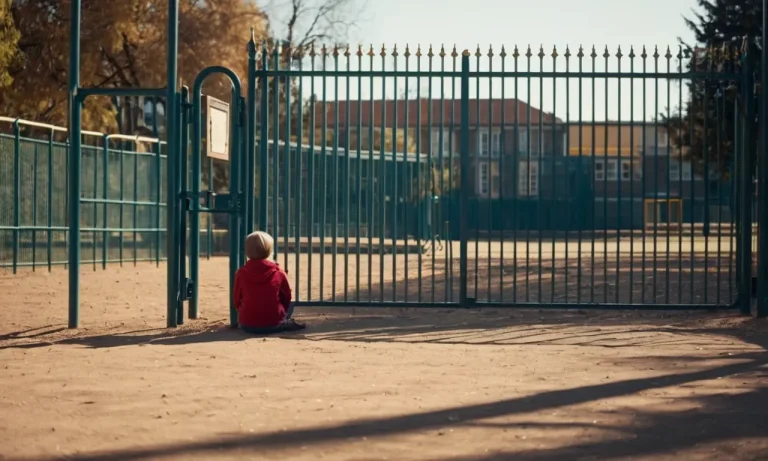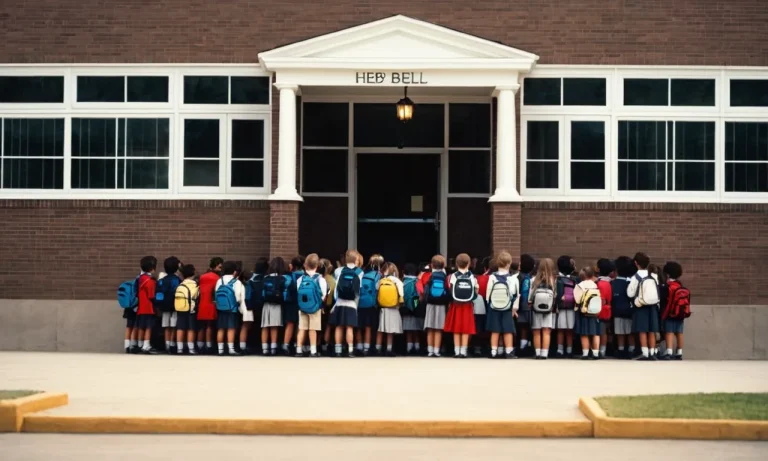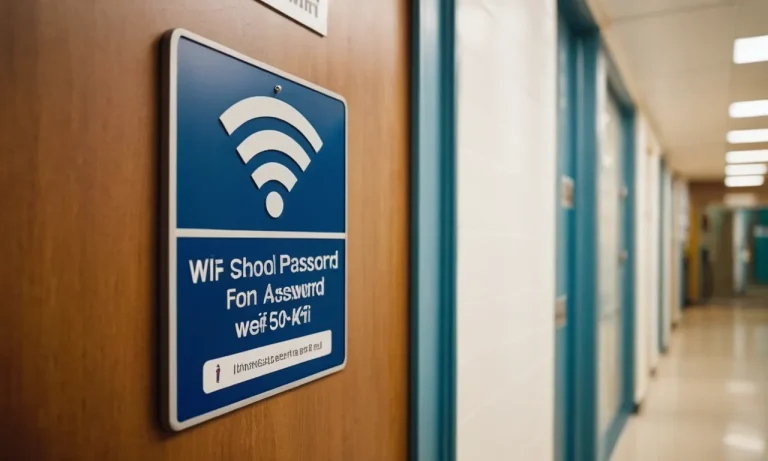Skipping school can be tempting, but the consequences can be severe. One common tactic students use to avoid attendance issues is providing a doctor’s note. However, do schools actually verify these notes, or is it just a formality?
This article will delve into the intricate world of doctor’s notes and school policies.
If you’re short on time, here’s a quick answer to your question: Yes, many schools do check the validity of doctor’s notes, but the extent of verification varies depending on the school district and state regulations.
In this comprehensive guide, we’ll explore the different approaches schools take when it comes to verifying doctor’s notes, the potential consequences of submitting fraudulent notes, and tips for navigating this process smoothly.
Whether you’re a student, parent, or educator, this article will provide valuable insights into this often-misunderstood aspect of school attendance policies.
School Attendance Policies and Doctor’s Notes
Importance of Regular School Attendance
Regular school attendance is crucial for a student’s academic success and overall development. According to a study by the National Center for Education Statistics, students who miss more than 10% of school days are at a higher risk of falling behind academically and dropping out.
Consistent attendance not only ensures that students don’t miss out on valuable classroom instruction but also helps them develop essential life skills like responsibility, discipline, and time management. 😊
Role of Doctor’s Notes in Excusing Absences
Most school districts recognize the importance of excusing legitimate absences due to illness or medical reasons. Doctor’s notes play a vital role in this process, serving as official documentation to justify a student’s absence.
However, it’s important to note that policies regarding the acceptance and verification of doctor’s notes can vary significantly across school districts and even individual schools.
Some schools may require a doctor’s note for any absence exceeding a certain number of days, while others may only request it for extended absences or recurring patterns of absence. Additionally, some schools may have specific guidelines on the content and format of the doctor’s note, such as requiring the date of the visit, the reason for the absence, and the expected duration of the absence.
Variations in School District Policies
School district policies regarding attendance and the acceptance of doctor’s notes can differ significantly. Here are some common variations:
- Some districts have strict policies that require a doctor’s note for any absence beyond a certain number of days, while others are more lenient and may not require a note for occasional absences.
- Some districts may have specific guidelines on the format and content of the doctor’s note, while others may be more flexible.
- Some districts may require additional documentation or verification for extended absences or recurring patterns of absence.
- Policies may also vary based on the student’s grade level or the type of school (e.g., elementary, middle, or high school).
To ensure compliance with their school’s attendance policies, it’s essential for parents and guardians to familiarize themselves with the specific rules and procedures regarding doctor’s notes and excused absences. Many school districts provide this information on their websites or in student handbooks.
Don’t hesitate to reach out to the school administration if you have any questions or concerns regarding attendance policies and the acceptance of doctor’s notes.
How Do Schools Verify Doctor’s Notes?
Schools take attendance policies seriously, and ensuring the validity of doctor’s notes is crucial. They employ various methods to verify the authenticity of these notes, as submitting fraudulent documents can lead to serious consequences. Let’s explore some common practices:
Direct Contact with Healthcare Providers
One of the most reliable ways for schools to verify doctor’s notes is by contacting the healthcare provider directly. This can involve calling the medical facility or practitioner to confirm the details of the note, such as the date of the appointment, the reason for the absence, and the recommended duration of the absence.
According to a survey by the Attendance Works organization, over 60% of schools reported using this method to verify doctor’s notes.
Checking for Authenticity and Validity
Schools also scrutinize the physical appearance and content of the doctor’s note. They look for indicators of authenticity, such as letterheads, official stamps or seals, and proper formatting. Any discrepancies or inconsistencies in the information provided can raise red flags.
Additionally, schools may cross-reference the note with their records to ensure the absence aligns with the student’s attendance history. A study by the American Medical Association revealed that nearly 30% of fake doctor’s notes were detected due to inconsistencies or formatting errors.
Automated Verification Systems
Some schools have implemented automated verification systems to streamline the process of validating doctor’s notes. These systems integrate with healthcare providers’ databases, allowing schools to instantly verify the legitimacy of a note by cross-checking the information against official medical records.
Companies like CertifyNote offer such services, claiming to have helped schools reduce the number of fraudulent notes by over 90%.
Consequences of Submitting Fraudulent Notes
It’s important to note that submitting fraudulent doctor’s notes is considered academic dishonesty and can have serious consequences. Penalties may include disciplinary action, suspension, or even expulsion.
In some cases, it could also lead to legal repercussions, as forging medical documents is a criminal offense. Schools take a zero-tolerance approach to such practices, as it undermines the integrity of the educational system and can have negative impacts on student attendance and academic performance.
Legal and Ethical Considerations
When it comes to schools checking doctor’s notes, there are several legal and ethical considerations that must be taken into account. These considerations revolve around issues of privacy and confidentiality, discrimination and accommodation, and potential legal ramifications.
Privacy and Confidentiality Concerns
Doctor’s notes often contain sensitive medical information about a student’s health condition or disability. According to the Health Insurance Portability and Accountability Act (HIPAA), this information is considered protected health information (PHI) and must be handled with utmost care to ensure privacy and confidentiality.
Schools must have appropriate safeguards in place to protect the confidentiality of students’ medical information and prevent unauthorized access or disclosure. Failure to do so could result in severe penalties and legal consequences.
Discrimination and Accommodation Issues
Schools have a legal obligation to provide reasonable accommodations to students with disabilities under the Section 504 of the Rehabilitation Act and the Americans with Disabilities Act (ADA). Refusing to accept or accommodate a valid doctor’s note could be considered discrimination based on disability, which is illegal.
Additionally, schools must be cautious not to single out or treat students differently based on their medical conditions or disabilities, as this could also constitute discrimination.
Potential Legal Ramifications
Schools that fail to properly handle doctor’s notes or accommodate students with disabilities could face legal consequences. According to a study by the National Disability Rights Network, approximately 3,500 disability-related complaints are filed against schools each year, with many of these cases involving issues related to doctor’s notes and accommodations.
If a school is found to have violated a student’s rights under HIPAA, Section 504, or the ADA, they could face legal action, fines, and potential lawsuits. In fact, a recent case in California resulted in a $4.75 million settlement after a school district was found to have discriminated against a student with disabilities by failing to provide appropriate accommodations.
😮
To avoid such legal ramifications, schools must have clear policies and procedures in place for handling doctor’s notes and providing accommodations. These policies should be communicated to students, parents, and staff, and consistently enforced.
Additionally, schools should provide training to staff on legal requirements and best practices for handling medical information and accommodating students with disabilities.
Tips for Students and Parents
Communicating with School Authorities
Open and transparent communication with school authorities is key when it comes to handling absences. Parents should promptly notify the school when their child will be absent, providing details about the reason. It’s also advisable to maintain a record of these communications for future reference.
Building a positive rapport with teachers and administrators can go a long way in fostering understanding and cooperation. According to a study by the National Center for Education Statistics, 76% of schools reported improved attendance rates when parents actively engaged with school staff.
Obtaining Legitimate Doctor’s Notes
If a student needs to miss school due to illness or injury, a legitimate doctor’s note can serve as a valid excuse. Parents should ensure that the note includes the date, the reason for the absence, and the healthcare provider’s signature.
Some schools may have specific requirements for doctor’s notes, so it’s essential to familiarize yourself with their policies. In a survey conducted by Attendance Works, 89% of parents reported that having a clear understanding of school attendance policies helped them provide proper documentation for excused absences.
Handling Chronic or Long-Term Absences
In cases of chronic or long-term absences due to medical conditions or other extenuating circumstances, parents should work closely with the school to develop an appropriate plan. This may involve providing regular updates from healthcare professionals, exploring homebound instruction options, or requesting accommodations under the Every Student Succeeds Act (ESSA).
According to the Centers for Disease Control and Prevention (CDC), approximately 5.4 million children in the U.S. miss school due to chronic health conditions each year. Proactive communication and collaboration with the school can help ensure that these students don’t fall behind academically.
Alternative Options for Excused Absences
- Religious observances: Many schools excuse absences for religious holidays or ceremonies. Parents should provide advance notice and documentation, if required.
- Family emergencies: Schools may excuse absences due to family emergencies, such as a death in the family or a sudden illness of a close relative. Clear communication and documentation are crucial.
- College visits: High school students are often allowed excused absences for college visits, with proper documentation and advance notice.
It’s important to note that school attendance policies can vary across districts and states. Parents and students should familiarize themselves with their specific school’s policies and maintain open communication with school authorities to ensure absences are properly excused and documented.
Ultimately, a collaborative approach between families and schools can help support student success and well-being.
Conclusion
Navigating the world of doctor’s notes and school attendance policies can be a complex and sometimes frustrating process. While schools have a legitimate interest in ensuring regular attendance and preventing abuse, students and parents also have rights and responsibilities.
By understanding the verification processes employed by schools, the legal and ethical considerations involved, and the best practices for obtaining and submitting legitimate doctor’s notes, students and parents can better navigate this aspect of the educational system.
Ultimately, open communication, transparency, and a commitment to following established policies and procedures are key to ensuring a smooth and fair process for all parties involved. With the right approach, doctor’s notes can serve their intended purpose of excusing legitimate absences without compromising the integrity of the educational system.






